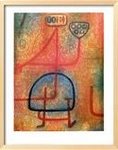As I noted below, my winter break was punctuated by my partaking in the MLA (the festivus for the rest of us, indeed: it is held annually in the week between Christmas and New Year's). I presented my paper on the first English literacy textbooks (part of a three-part panel -- a trilogy -- on "The History of the Book"), and attended other panels, some in my field of early modern English literature, and some on (drumroll) . . . the academic blog.
I had thought that the visibility of the genre in this year's program would herald its arrival as a legitimate academic medium. After all, I myself have speculated that profs might utilize blog technology (blogology?) to commune on matters related to teaching -- that the convenience, immediacy and *reach of a blog post would enable us to confer, in near real-time, on pedagogical conundra (or crises). Even more, I have noted how blogs offer a study in contrast to the way we (academics) ordinarily communicate through publication. The path from research (to draft to submission to editing) to publication is protracted and obstacle-strewn; a blog post appears quick as a pixel.
I thus attended the MLA panels hoping to hear how we could develop the academic blog to exploit its reach and immediacy (on the one hand) and to render the medium a legitimate forum for scholarship (on the other). That is, obstacles exist on the way to publication in order to preserve the integrity of the academic product; but anyone with a keyboard can produce a blog post, and write just about anything they like.
Philip II of Spain really wrote the works of Shakespeare!
See? Just like that.
Though he would likely credit others with this distinction, the poster child for the academic blog is one Michael Bérubé, the Paterno Family Professor of Literature at Penn State (and please, Professor Bérubé, tell me you work that title in your own pedagogy, with line calls such as "first paper? First down!" and "How do we write a list of works cited? Let's consult the playbook. . ."). Busy completing my own PhD (touchdown), starting my first tenure-track job (free agent no more), and acclimating my young family to life in Ontario (a two-point conversion), I confess I have not yet read Monsieur Bérubé's books, and should (I will). Where he writes on the academic profession and the place of the intellectual in contemporary society, I specifically conceived my own dissertation to trace the idea of an English literary persona -- the man [sic] of letters -- to the emergence of English as a literary language (. . . in the sixteenth century). In fact, this very blog complements, and means to update, my scholarship by reading its findings through a contemporary lens.
In person, Bérubé cuts an interesting figure; the best word I can coin is dashing. Dashing because witty and charming; he has charisma, no doubt, and works it. But dashing also because he speaks at speeds that suggest he is already late for his next engagement. His prose-style rangy, glib, and diffuse, Bérubé himself is a study in contrast to the ponderous, stentorian English professor, the stereotypical man of letters. A vital advocate for our profession, and vocal champion of the academic blog . . . Bérubé views blogging as incidental, nay "marginal" -- *his word -- to scholarship.
I blame myself for my disappointment in hearing this. You see, I had the temerity to ask the first post-panel question, and while rangy, glib, and diffuse, my question was no doubt unwieldy and unfocused. I launched it in terms of how we represent academic blogging to our own colleagues in the department, and eventually (I know, groan) wrapped it up by asking "how I get my blog on my tenure file." What I was really interested in -- a touch of l'esprit de l'escalier here -- is how we might view, and value, blogging as a legitimate form of academic labor, beneath, though in some way beside, the holy trinity of research, teaching, and service.
You reap what you sow, however, and my pithy conclusion about getting my blog on my tenure file prompted Bérubé's equally pithy (though no doubt more humorous) response, replete with a witty replay of run-ins with his more ponderous colleagues (i.e., "Michael, I see you have a [get out yer finger quotes here] 'web-log'"). But while Bérubé had noted in his talk the role academic blogs play in demystifying academic labor for the general public (a point I had also made here), he responded to my question by saying that he considers the blog "marginal" to his "other work" -- potentially an "aspect of service," but chiefly part of his "personal time."
I was surprised to hear him conceive the arrows going only in one direction -- that is, from academia out to the public sphere. And while I don't wholly disagree with him, given the lack of stop-gaps in place to qualify blogging as scholarship (never mind gnarly issues concerning copyright and intellectual property), I would like to see this new medium of the public sphere generate new, and vital, ways for us to communicate as scholars -- that is, to have the arrows point the other way as well. It remains to be seen whether and how this could happen, and I, for one, will continue to mull on that question here.
For now, however -- and this is a special welcome to those who might be coming here from the Chronicle (in which my blog is featured, in fact, as having grown increasingly incidental to my academic life) -- welcome to the margins.
Sunday, January 07, 2007
Welcome to the Margins
Subscribe to:
Post Comments (Atom)



2 comments:
I've been lurking here for a few weeks as a fellow blogger and Renaissancer, and I'm delurking, now, simply to point you in the direction of a number of interesting post-MLA reflections on blogging and its "utility," made by many of the bloggers I myself read.
This one, by Dr. Crazy, is probably most relevant for your purposes, as it begins with your own question about how we can make blogging "count," but here are a couple of others.
I like Crazy's argument that blogging is, more than anything, a form of service work, and that's certainly true of my own blog, which is much more in the category of "academic lives" than it is a research or Renaissance-specific blog (though there are quite a lot of the former, and some of the latter out there that I enjoy). That's my own generic preference. However, it seems to me that even those field-specific blogs that I read and comment on are functioning essentially as early modern reading groups or colloquia: a place to bat ideas around, talk about some interesting recent scholarship, an odd find in the archives, whatever. That's an invaluable service, but it's hard for me to imagine how it would or should "count" in any formal way.
I look forward to following your blog in the future.
Flavia,
Thanks so much for unlurking and for giving me the heads-up on these other posts.
I've since been corresponding with none other than Dr. Crazy. . . and will post on this exchange, and your comment soon, as I've managed to figure out what I really meant to say when I asked that lame question: really, far more thoughtful -- and less crass and mercenary -- than originally (and unfortunately) suggested. Btw, I never said the word "count" -- indeed my question was meant to challenge the whole idea of academic tallying in the first place. . . (tho you'd hardly know it! I promise, I'll explain).
Until then, I wholly agree with you that the group blog seems to be where the action is at viz. the notion of blog as scholarly "conversation" . . . how amusing it was to have David Greenberg claim to have invented it for the New Republic!
Thanks again for the links, and I, too, look forward to more unlurking on your part . . .
More soon.
Post a Comment